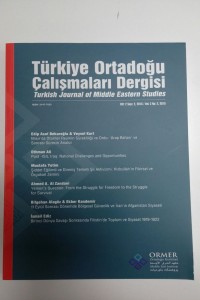Öz
When Yemenis demonstrated almost 5 years ago, shouting “The People Want the Fall of the Regime,” they did not know how complex the situation is, and how regional and international powers will determine their future. As one of the objectives of the revolution, Yemenis deemed that by removing President Salih from power, the revolution would guarantee their freedom. But the politics of the Arab World and the Middle East proved otherwise. Since the collapse of the Ottoman Empire almost a century ago, the Arab World has been subjected to the hegemony of the great powers. Thus, the real obstacle for democratic transition within the Middle Eastern countries comes from outside rather than domestic threats. The objective of this study is to demonstrate that revolutionary leader’s reliance on foreign powers to change the political system and to achieve the revolutionary objectives was counterproductive in which constituted a huge obstacle in achieving those objectives, paving the way to civil war in Yemen, turning the struggle for freedom to struggle for survival.
Anahtar Kelimeler
Yemen National Dialogue Conference Civil Conflict. Houthi Separatist
Kaynakça
- Barnett, Thomas. (2003), “the Pentagon’s New Map”, Esquire, via Thom- aspmbarnett, http://www.thomaspmbarnett.com
- Buzan, B. (2003). Implications for the study of international relations. In Buckley M. & Fawn, R. (eds.), Global Response to Terrorism: 9/11, Afghanistan and Beyond (pp. 269-309). New York: Rout- ledge.
- Dessouki, A. H. (1991). The primacy of economics: the foreign policy of Egypt. In Koraney, B. & Dessouki, A. H. The foreign policies of Arab states: The challenge of change. Oxford: Westveiw Press.
- Harvey, A., Sullivan, I., & Gorves, R. (2005, Autumn). A Clash of systems: An analytical framework to demystify the radical Islamist threat. Parameters , 35 (3), pp. 72-86.
- Hinnebusch, R. & Ehteshami, A. (2002). The foreign policies of Middle East states. London: Lynne Rienner.
- Khor, Martin. (2000). Globalization and the South: Some Critical Issues (Malaysia: Third World Network.
- Murden, Simon W. (2002). Islam, the Middle East, and the new global he- gemony. London: Lynne Renner.
- Rosenau, James N. (1997). Along the domestic-foreign frontiers: Explor- ing Governance in a turbulent world. Cambridge: Cambridge University Press.
Öz
Bundan yaklaşık beş yıl önce “halk yönetimin düşmesini istiyor” sloganı ile sokaklara akın eden Yemenliler, kendi geçmişlerinin, hali hazırdaki durumlarının ve geleceklerinin bölgesel ve küresel güçler tarafından nasıl bir karmaşık durum ile kontrol altına alındıklarının bilincine hiçbir şekilde sahip değillerdi. Yemenliler gösteriler anında yolsuzluğa batmış başkanları Salih’i devirdiklerinde aslında Yemen’deki devrimin mutlu son ile neticeleneceğini düşünmüşlerdi. Fakat küresel siyasetin gerçeği ve özellikle de Ortadoğu’nun Arap dünyası hikayeyi farklı şekilde anlatacaktır. Arap dünyası yaklaşık bir asır önce Osmanlı halifeliğinin yıkılmasından sonra hegemon güçlerin kontrölünde olmuşlardır. Bundan dolayı bu ülkelerin herhangi birinde gerçekleşek olan barışçıl demokratik geçiş süreci ulusal tehlikeyi ikinci sıraya iterek uluslarası düzeyde bir tehlike olarak değerlendirilmektedir. İşte bundan dolayı da bu çalışma devrim öncülerinin yolsuzluğa bulaşmış liderlerinin devrilmesi konusunda kendi halkından daha çok dış güçlere güvenmelerinin hata olduğunu gösterecektir. Doğrusu Yemenlileri özgürlükleri için verdikleri mücadaleden kendi yaşamlarını sürdürmelerinin uğraşına neden olan bir sivil savaşın içine sürüklediğinin gerçeğini ortaya çıkaracaktır
Anahtar Kelimeler
Yemen Ulusal Diyalog Konferansı Sivil Çatışma Husiler Ayrılıkçı Liberaller
Kaynakça
- Barnett, Thomas. (2003), “the Pentagon’s New Map”, Esquire, via Thom- aspmbarnett, http://www.thomaspmbarnett.com
- Buzan, B. (2003). Implications for the study of international relations. In Buckley M. & Fawn, R. (eds.), Global Response to Terrorism: 9/11, Afghanistan and Beyond (pp. 269-309). New York: Rout- ledge.
- Dessouki, A. H. (1991). The primacy of economics: the foreign policy of Egypt. In Koraney, B. & Dessouki, A. H. The foreign policies of Arab states: The challenge of change. Oxford: Westveiw Press.
- Harvey, A., Sullivan, I., & Gorves, R. (2005, Autumn). A Clash of systems: An analytical framework to demystify the radical Islamist threat. Parameters , 35 (3), pp. 72-86.
- Hinnebusch, R. & Ehteshami, A. (2002). The foreign policies of Middle East states. London: Lynne Rienner.
- Khor, Martin. (2000). Globalization and the South: Some Critical Issues (Malaysia: Third World Network.
- Murden, Simon W. (2002). Islam, the Middle East, and the new global he- gemony. London: Lynne Renner.
- Rosenau, James N. (1997). Along the domestic-foreign frontiers: Explor- ing Governance in a turbulent world. Cambridge: Cambridge University Press.
Ayrıntılar
| Bölüm | Makaleler |
|---|---|
| Yazarlar | |
| Yayımlanma Tarihi | 18 Nisan 2016 |
| Yayımlandığı Sayı | Yıl 2015 Cilt: 2 Sayı: 2 |
TOÇD'nde yayınlanan makaleler Creative Commons Atıf-GayriTicari 4.0 Uluslararası Lisansı ile lisanslanmıştır.


